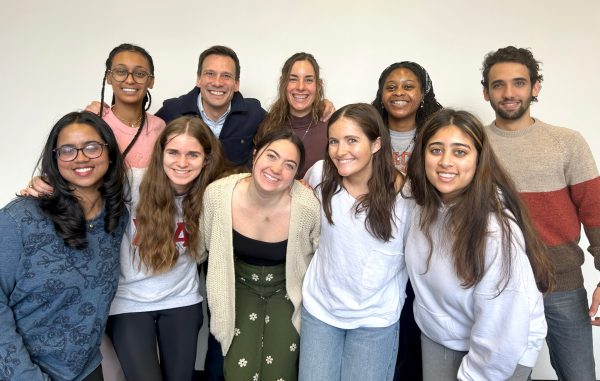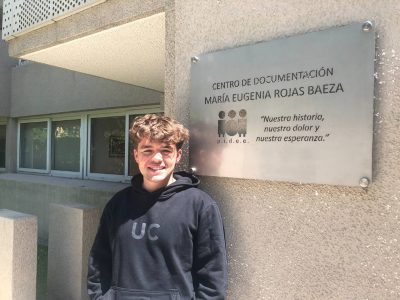A&S Offers More Community Learning Pathways for Arts and Sciences Undergraduates
As the popular adage goes, “Tell me and I forget, teach me and I may remember, involve me and I learn.” An essential step in preparing students to tackle today’s pressing challenges, like climate change and social and economic inequity, is immersing them in projects that go beyond the classroom and into communities. A study by the American Association of Colleges and Universities notes that students who participate in community-engaged work experience improved learning outcomes and enhanced soft skills, such as communication, teamwork and critical thinking.
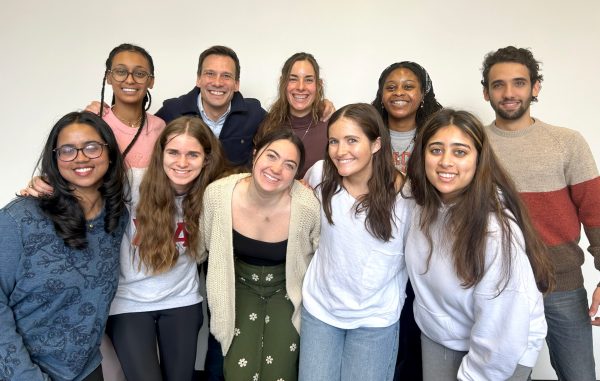
In the College of Arts and Sciences (A&S), undergraduate and graduate students have access to myriad community-based learning opportunities through the Engaged Humanities Network (EHN). Founded in 2020 by Brice Nordquist, Dean’s Professor of Community Engagement in A&S, EHN has provided support to over 400 faculty, staff and students who participate in publicly engaged work. It has also backed more than 20 community-engaged courses and fostered partnerships with over 35 different community organizations. Nordquist says the goal is to empower students and faculty to utilize their knowledge and skills for the public good while also cultivating relationships of trust and mutual support across communities.
A Structure for Success
Support from A&S has enabled EHN to expand its undergraduate research program to offer even more students sustained community-engaged learning opportunities. According to Nordquist, this involves building up a more scaffolded and integrated structure where students receive ongoing mentorship as they advance through EHN programming, culminating in an independent research project.
“EHN has had an undergraduate research program since its inception, but as we grow, we’re working to better integrate with curricula,” says Nordquist. “We’re also striving to create a framework to help participating students move through stages of research collaboration and development, while providing enhanced support through one-on-one and cohort-based research mentorship.”
Here’s how the new EHN undergraduate research program works:
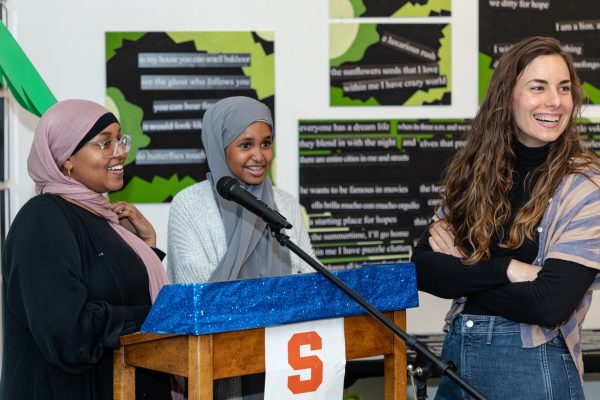
Step 1: Engaged Courses – In their first or second years, A&S students become eligible for EHN Undergraduate Research Assistantships (URAs) by taking select liberal arts courses offered annually in conjunction with signature areas identified in the A&S Academic Strategic Plan and the EHN’s Engaged Courses program. This program provides funding and cohort-based pedagogical and logistical support to faculty across departments who are integrating community-engaged learning into new and existing courses.
Step 2: Undergraduate Research Placements in Engaged Communities Projects – In their second or third years, students who have completed Step 1 apply for EHN URA positions. Ten to 12 students receive assistantships and one-year placements into Engaged Communities interdisciplinary, community-engaged project teams.
Step 3: Independent Project Design and Implementation – In their third or fourth year, EHN URAs receive research design and proposal mentorship and pursue their own projects within or adjacent to their work in Step 2. URAs receive research grants to be used for local, away or abroad community-engaged projects.
A&S Dean Behzad Mortazavi notes that this latest investment will ensure that more A&S students gain the opportunity for sustained hands-on experience, equipping them with the skills to be successful after graduation.
“EHN has seen enormous growth and success in just four years, and we are proud to support its next phase of development,” says Mortazavi. “This strategic investment will enable more of our students to significantly contribute to work which directly addresses the world’s most pressing challenges.”
Helping Local Residents
Aamna Khan ’26 is one of the undergraduate students in the EHN URA cohort making a difference in the local community. As part of a research team with professors Tao Wen and Aaron Mohammed from the Department of Earth and Environmental Sciences (EES), she is working to install urban stream monitoring stations to investigate how extreme precipitation and other factors are affecting a Syracuse waterway. By collaborating with individuals in Syracuse’s Valley neighborhood, Khan is tracking the urban watershed to help protect residents and inform policymakers about potential risks to property and health.
The team’s work is part of EHN’s Engaged Communities program. By being agents of change, students like Khan are applying the knowledge they learn in class to real-world situations to enhance their civic-mindedness, problem-solving skills and sense of social responsibility.
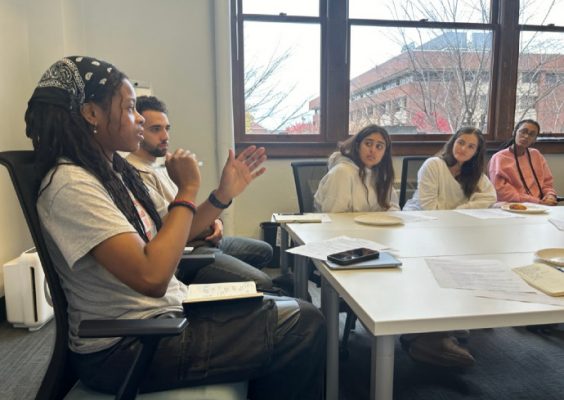
“This opportunity has been amazing for my undergraduate career,” says Khan, who is triple majoring in environmental geoscience, sustainability and policy, and history in A&S | Maxwell. “Since the University is so intertwined with the city, being able to have that engagement and work on something that directly affects the people of Syracuse really teaches you a lot about purpose in what you’re doing.”
Access to Mentors
To help students navigate the complexities of their projects, Khan and the other EHN URAs are receiving mentorship from Lauren Cooper, who received a Ph.D. in English from A&S in May 2024. She is one of two inaugural Engaged Humanities Postdoctoral Fellows at the Syracuse University Humanities Center, made possible through a partnership between the Office of Research and the College of Arts and Sciences.
Cooper has played an integral role in helping grow EHN over the past several years. She has helped to spearhead numerous EHN initiatives like Write Out, where she and other faculty and students from SU work with Syracuse-area youth to help them improve their writing and storytelling skills. She says that providing undergraduate students structured support and mentorship will ensure that they have the opportunity to thrive as they progress through the more advanced stages of community work.
“For students in the humanities, community-engaged research helps expand their sense of what kind of future intellectual work might be possible and encourages them to start to think of themselves as scholars, not just as students,” says Cooper.
Hitting the Ground Running
Maeve Ryan ’27 was eager to dive into community-engaged work from the time she arrived at Syracuse. As a freshman she joined the EHN’s educational collaboration with Deaf New Americans Advocacy, Inc., a Syracuse-based organization which helps Deaf New Americans develop education, leadership and life skills. She now helps coordinate the CODA (children of Deaf adults) program.
“Speaking sometimes three or four languages – English, Nepali, Nepali Sign Language and American Sign Language – these students face barriers to communication within the public school system,” says Ryan, who is a dual major in history and law, society and policy in A&S | Maxwell. “As a program leader, I aid them with schoolwork and creating connections to enhance their communication skills.”
This year, Ryan joined the EHN undergraduate research assistant cohort and has found it both motivating and insightful to connect with other like-minded students who are passionate about community-engaged work. She values the regular cohort meetings, where each student shares unique insights and perspectives from their projects, fostering valuable discussions and creative problem-solving.
“Becoming involved in this program has been such an enriching experience,” says Ryan. “The relationships I have developed, not only with the students I tutor, but also the cohort of other undergraduate research assistants, have been incredibly rewarding and opened my mind to new perspectives.”
In addition to support from A&S, undergraduate research assistants like Khan and Ryan are also supported through the EHN’s partnerships with the SOURCE and the Center for Fellowship and Scholarship Advising.
More Opportunities for Engagement
With this latest expansion now underway, Nordquist is thinking toward the next opportunity for growth. To bring in more A&S faculty, he would like to see each department offer at least one experiential learning opportunity that could be integrated into EHN’s programming structure.
“This could be a way of bringing the College together with shared goals and investments of time, energy and diverse and important expertise around pressing local issues,” says Nordquist.
He would also like to create more opportunities for community-engaged learning at various educational levels. To support this, he hopes to establish a summer academy that unites secondary and higher education teachers in Central New York. This initiative would enable high school teachers to integrate community-engaged elements into their curricula, establishing pathways for students interested in this work to continue their education at Syracuse University.
